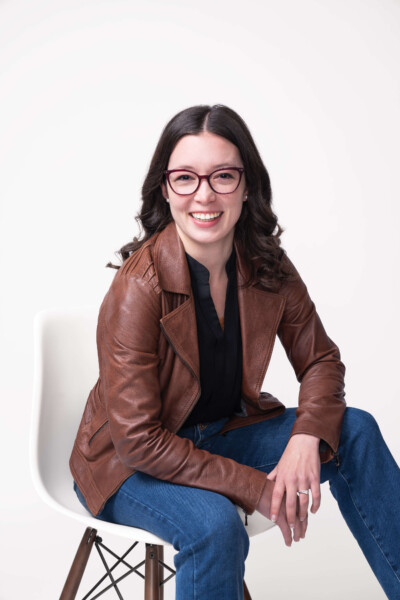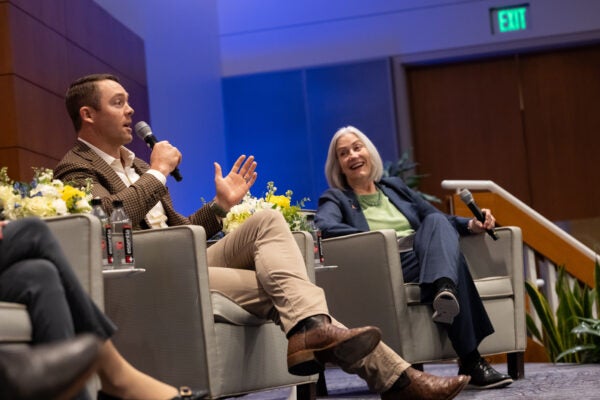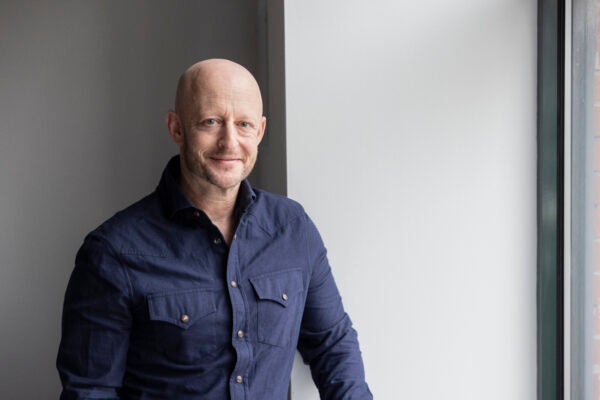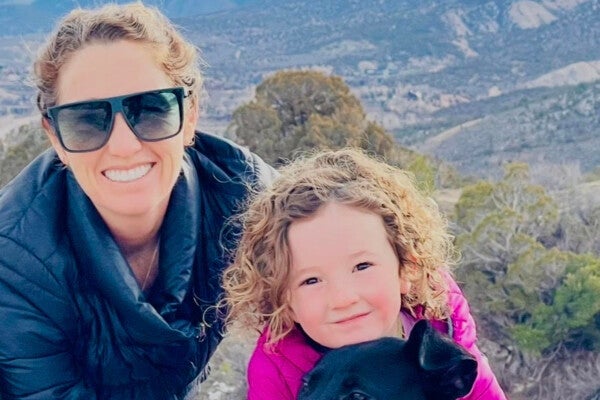Rachel Woods, MIS ’18, Wants to Make Artificial Intelligence Accessible to Any Small Business
by Omar L. Gallaga
By the time she was a 15-year-old Austin high school student, AI influencer Rachel Woods, MIS ’18, had already cornered a business market.
Discovering that a job making sandwiches and talking to customers at the same time wasn’t working for her, she combined a passion with a talent: shooting photographs. Woods’ Nikon D5500 camera was her constant companion, and she never passed up a chance to use it.
Her boyfriend, now her husband, encouraged her to build a website and start a business around photography. Before long, Woods figured out her market. She made business cards and handed them out to the boys at Westwood High School, who were more reluctant to push their parents for pictures than girls were. She told them, “Give this to your mom because your mom’s going to make you get senior photos, and you’d rather hang out with me for an hour than an adult photographer.”
Soon, she was booked every weekend, making $50 an hour. “I dominated senior-boy photography,” she jokes.
She didn’t know it then, but honing skills around marketing herself and her talents was going to pay off someday. It would eventually pair with Woods’ knowledge and curiosity around artificial intelligence, leading her to launch an AI firm to help other entrepreneurs after cultivating an online video audience.
Woods’ foray into photography didn’t last long. What excited her more was building a business. That entrepreneurial drive would lead her to start two companies after she graduated from McCombs. The first one, Vinebase, helped wineries better market themselves. Her other company, The AI Exchange, which launched last year, seeks to bring the power of artificial intelligence to small businesses that need the help.

Where Tech, Business Meet
After high school, Woods headed to McCombs where she realized, “Oh my gosh, there’s so much more to learn.” There, she says, she felt “like the world opened up in amazing ways.”
As a management information systems major, she got involved with the American Marketing Association and racked up several internships. At Austin-based Indeed, she met marketers who also knew how to write computer code. Woods says that ignited her, setting her on a path to explore the intersection of business and technology. Another internship landed her at Facebook (now Meta), where she worked on a data-science research team on the company’s formidable marketing and advertising platform. “You couldn’t have written a better job for my two passions at that time,” Woods says.
After graduation, Facebook wanted her back. She moved to San Francisco in 2018 and worked on projects using tools that eventually evolved into AI products. The experience was “amazing,” she says, and was lucrative for Facebook. But the entrepreneur in Woods wanted to try something different. Something new, involving wine.
Fermenting Business Ideas
The pitch for Woods’ first company, Vinebase, was this: Wineries might be making great wine, but like any small business, they need a loyal customer base. “It’s really hard for small independent wineries and producers to get their name out there, get their wine sold, and run their business,” Woods says.
Her company created an AI-assisted software platform to help wineries with business tasks and marketing. Woods raised nearly $4 million in venture capital and signed up about 100 wineries to use Vinebase. She sold the company in 2022.
As she was looking for her next project, Woods did some consulting and got deeper into AI, fielding questions online about its applications. On Nov. 1, 2022, she started a TikTok channel and began posting videos in which she talked about building startups using AI. “The world needs to know about AI,” she thought.
On Nov. 30, 2022, the world responded in a big way when ChatGPT debuted and went mainstream more quickly than anyone had expected.
Her TikTok videos soared in popularity as interest in ChatGPT exploded. Eventually, ChatGPT grew to more than 180 million users. Woods drew more than 160,000 followers on TikTok, and her videos earned more than 1.6 million likes. She addressed topics such as “Using AI to write job descriptions” or “What do AI jobs look like?”
The success of the TikTok channel led Woods to create a business around two fundamental AI problems: Few people know how to get the most out of this new technology, and everybody has questions about it.
Woods enlisted her sister, Kristin Downs, BBA ’20, MPA ‘21, who also worked on Vinebase, to start a new company that would help small businesses that can’t afford extra staff or consultants get set up with AI services and prompts. A prompt could be a request you make of AI software including ChatGPT such as, “Organize a spreadsheet for me based on this page of text” while an AI service could be a tool like DALL-E that will generate a new image from a text suggestion such as, “Draw me a punk-rock unicorn.”
They called the company The AI Exchange and set it up as a community where not only would the company assist and educate clients, but so would other users. By the end of 2023, The AI Exchange had about 200 companies signed on and more than 1,800 paying community members in addition to subscribers to its free newsletter. Its business model is twofold: It offers training and resources to its paid membership à la carte or for a membership pass that gives access to a private Slack channel, member-only discussions, and events. Woods and her company also consult directly with small businesses to improve their workflow and operations by using AI.
Bob Pearson, a McCombs lecturer and founder of public relations and consulting company The Next Solutions Group, says Woods is well suited to leading the way for others in AI. “The pace of technology and AI, in particular, requires navigators who possess an innate ability to absorb complexity and provide pragmatic solutions that benefit all leaders. That’s Rachel.”
By focusing on small businesses, The AI Exchange, which has two other employees in addition to Woods and Downs, is “democratizing access to how AI can be applied for internal operations,” Woods says. The AI Exchange itself is a test bed for doing so; the operations of the company are built on AI. “The way my day-to-day running this business looks couldn’t be more different than how I was running my last company,” she says.
Return to McCombs
In late October 2023, Woods took the stage at Crum Auditorium at McCombs, returning to Austin for a marketing presentation called “The Future of AI-Powered Work.”
Woods forecast the impact of artificial intelligence. She suggested some of the latest AI-powered tools that marketing experts should be aware of can perform tasks like search and video editing. She made a strong case for being the person in any organization who embraces and knows how to use AI.
Like others in the tech industry, Woods says she believes AI has the power to free us from busy work to focus more on things like providing good customer experiences and doing more top-level thinking. AI is not a way to avoid work, but an opportunity to delegate tasks to free up time and tackle bigger challenges.
The next year of AI is likely to be one of explosive growth, with entrepreneurs such as Woods seeking to find new ways to use these technologies. But she thinks it’s even more important to enable small businesses to feel they’re mastering AI, not being overwhelmed by it.
“The mindset you have to have with AI is, ‘How can I be a little bit bossy and delegate what I want done to this system so that it does it for me?’ I think that’s a new skill set, a new behavior for people to learn.”
About this Post
Share:


